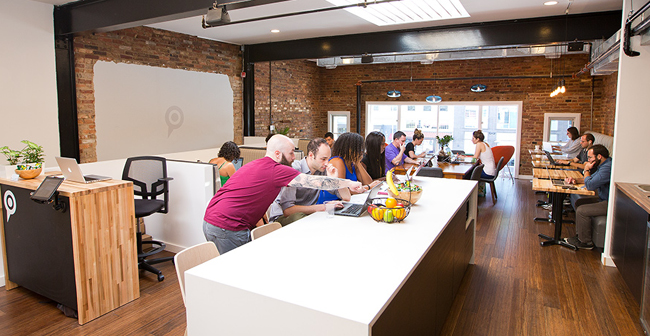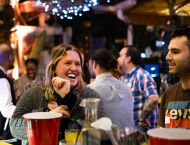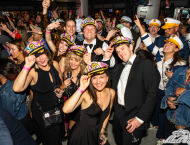Culture

The Times, They Are A Changin’: How We (Co)Work in the Nation’s Capital
July 1, 2017 @ 12:00am
For many years, Washington was known as a “bridge and tunnel” city (sans the tunnels), catering largely to government, political and NGO commuters from the surrounding suburbs.
But the recent influx and staying power of a new generation has dramatically altered the ways, sectors and venues in which we live and work.
As more people call DC their permanent home – according to Census Bureau estimates from December 2016, the population of District residents is at a 40-year high and has increased more than 13 percent since 2010 alone – nearly all aspects of capital city living have shifted. Notably, how and literally where Washingtonians are making their hard-earned dollars. And I mean hard-earned – as of 2015, we have the country’s second longest work week, not counting commute time.
And though many of those dollars are spent on booze and brunch and boozy brunch to alleviate the stress of said-prolonged workweek (cheers to the restaurant and food service industries that employ eight percent of us), many working Washingtonians and their employers are embracing “alternative” work structures to increase what I like to call the employee contentedness quotient (and, theoretically, in turn, productivity).
What do some of those alternatives look like? At the most extreme end, we see individuals leaving high-paying/higher stress jobs in traditional sectors like finance and marketing to pursue passion projects – some of which, like locals District Dogs and Timber Pizza, have grown into successful neighborhood and community-based businesses.
Next, we note that even many of DC’s traditional workplaces are not so traditional anymore; in fact, the enterprises that topped 2017’s lists of best places to work in the DMV include those that offer perks beyond 401ks and pension plans. Instead, the area’s most satisfied employees are seeking companies and organizations that incentivize their staff with benefits like social outings, meals, paid volunteer time, sabbaticals, flexible schedules, easy teleworking options and even pet insurance.
But the real change is manifested in the middle ground between striking out into uncharted territory and attempting to alter the labor machine from within – and that is the universe of coworking.
As any coffee shop owner can tell you, coworking is not a novel concept. But with more than 40 percent of the American workforce now employed on a contingency basis, and with the gig economy growing ever stronger, coworking as a concept has evolved into an industry in and of itself.
Over the past five years, creative coworking establishments in the metro DC area have grown by 195.9 percent annually. In just one year, from 2014 to 2015, DC saw a 17.2 percent increase in coworking desk space. And as of July 2016, coworking space within the District alone (not including the suburbs) totaled 1.8 million square feet.
As a steadily growing urban industry, coworking bolsters other industries in the area as well, most significantly the commercial real estate market. But less obvious city services and local businesses are thriving in the boom, too. Take Marta Staudinger, founder and director of Brookland’s Latela Art Gallery. Several clients who lease space in the coworking offices around town have commissioned Staudinger and her team, who offer commercial art and design services.
“We specifically find pieces with energies that match those of the businesses we work with, as the visual space is both a reflection of companies’ goals, and also impacts their employees’ productivity,” says Staudinger, who even sometimes offers her own her gallery at the Monroe Arts Walk to those seeking a mindful, collaborative work environment.
It is important to note that not all of that space looks – or costs – the same. As in any industry, owners of coworking spaces have learned to match their brand and price point with target audiences. Around Washington, the most visible coworking brands can largely be separated into three alliterative (and admittedly generalized) categories: hipster haunt, startup sanctum and big-time boutique.
From the first, we have coffee shops, including neighborhood favorites Slipstream, Compass, La Colombe, Tryst, The Coupe and Colony Club; and small creative co-ops and co-labs like Beyond Studios, H Street’s Femme Fatale pop-up and this past winter’s iteration of Steadfast Supply, to name a few. While space at such establishments can be limited, these coworking options offer a comfortable, yet often inspiring environment in which to work outside of the home – a perk for the city’s rising class of freelancers and independent creative industry professionals. Though you won’t find printing rooms or conference call lines, the bonus is a relaxed vibe and cheap rent; these are largely available for the cost of a couple cups of coffee, a pair of headphones and a messenger bag.
Next, we have coworking spaces that resemble the “campus” feel of many of the city’s new residential developments – one-stop shops with social, recreational and dining options all in one complex; the manifestation of a meta-desire to maintain the safety net of college life that those now comprising the majority of the workforce were thrust out of and into the cold hard world of the Great Recession? Perhaps.
When most people imagine coworking in DC, the image that comes to mind is that of WeWork’s trendy Manhattan Laundry and Wonder Bread Factory buildings full of sexy startups.
To be sure, WeWork has taken DC by storm, with eight buildings within the District and Virginia, and two more on the way. The company offers a suite of membership options, from a $45/month plan for one day, to private offices with 24/7 access starting at $400/month. But more than space, WeWork offers a culture – with amenities like dry cleaning, craft beers on draft, putt-putt golf cubbies, yoga and member retreats – that is designed for “fresh ideas and organic growing” defined by “personal fulfillment.” The chic factor of the WeWork’s real estate matches their ethos, and their brand is a favorite among DC’s burgeoning tech and startup industries.
But WeWork isn’t the only game in town. Adam Segal, cofounder and CEO of Cove, says his company is about getting to know their neighbors and finding out who their coworkers are.
“We are a neighborhood space fit to bring neighbors together, meet each other, say ‘Hello’ and feel comfortable doing that,” says Segal of his company’s five locations around the city. “We don’t see ourselves as an incubator or an accelerator in the workplace sense, but in the sense of tapping into the unique communities in the unique neighborhoods throughout DC.”
Plans at Cove are up to $249/month, but with fewer frills than other coworking options. Segal likens being a member of a coworking space to having a gym membership, and hones in on similar visual cues to productivity that Staudinger stressed.
“For independent workers, we separate home space from workspace,” he says. “We’re not trying to replace traditional workplaces, but to augment them. We want to be a space for startups and/or new businesses to get off the ground without the overhead cost of renting an office space.”
But coworking is not just for the oft-denigrated “dream-chasing” millennials (aren’t we over that trope yet, anyway?)
A sizable portion of those nearly 2 million square feet of coworking space in the District (and more beyond) are colonized by our third category of businesses.
These coworking spaces cater to demands from niche markets and established companies facing and/or embracing shifts in corporate structure and subsequent real estate downsizing. With locations in Crystal City and Rosslyn, Eastern Foundry, for example, offers collaborative workspace tailored specifically to government contractors, one of the largest sectors of the DC area workforce.
“Geoff and I started Eastern Foundry to create a community where government contractors large or small and government agencies could convene to exchange ideas, opportunities and work together to smooth out the government contracting process,” says CEO Andrew Chang.
Among the area’s other boutique brand companies are those that market to high-end, mostly corporate consumers that don’t want to be locked into long-term leases on expensive space that ends up empty due to a more mobile workforce. Founder and CEO of Serendipity Labs John Arenas describes his company – with strategically chosen locations around the country in areas like Bethesda, Maryland – as an “upscale work club for what we call trusted knowledge workers – people who can choose how, when and where they want to work.”
Workers like those who occupy space at the Bethesda location, Arenas says, have been given a lot of freedom to become consumers of the workplace, and he is selling a “hospitality brand that can serve as an extension of the corporate workplace – not what coworking has been.” His goal is to “raise the bar on coworking.”
“That’s where the largest demand is and will be because we’re serving across industries,” he says. “Heineken, Airbnb, Deloitte [and] Accenture all are trying to support mobility to retain employees, but also to reduce real estate costs.”
One of Arenas’ main competitors in this tier, Spaces, is owned by his former company Regus Americas. Spaces recently opened a location at the Uline Arena in DC’s NoMa neighborhood, and will be opening another in Arlington in the fall. Kristin Nori, Spaces’ DC area manager, says many of their clients are coming from other coworking spaces in search of a better product, one with flexible space that can grow or shrink with a company’s needs, provide large event areas and has a luxury feel.
“Historical features of [the Arena] and the vibe we’ve created is attractive to people,” Nori says. “We differ from [other coworking spaces] in that we’re a couple steps up; we have more mature clients. Companies search for space with us to take it to the next level.”
Clearly coworking is not a one-size-fits-all endeavor; and as diverse as DC’s workforce is, it’s no surprise that more and more spaces are cropping up to fit equally diverse needs. But whether you’re a looking for a creative community, a high-energy laboratory or a flexible corporate arm, everyone seems to agree that coworking is not a flash-in-the-pan trend, but rather, the way of the future and the norm from here on out, both within the DMV and beyond.
Learn more about these coworking spaces at their websites:
Cove: www.cove.is
Eastern Foundry: www.eastern-foundry.com
Serendipity Labs: www.serendipitylabs.com
Spaces: www.spacesworks.com
WeWork: www.wework.com







